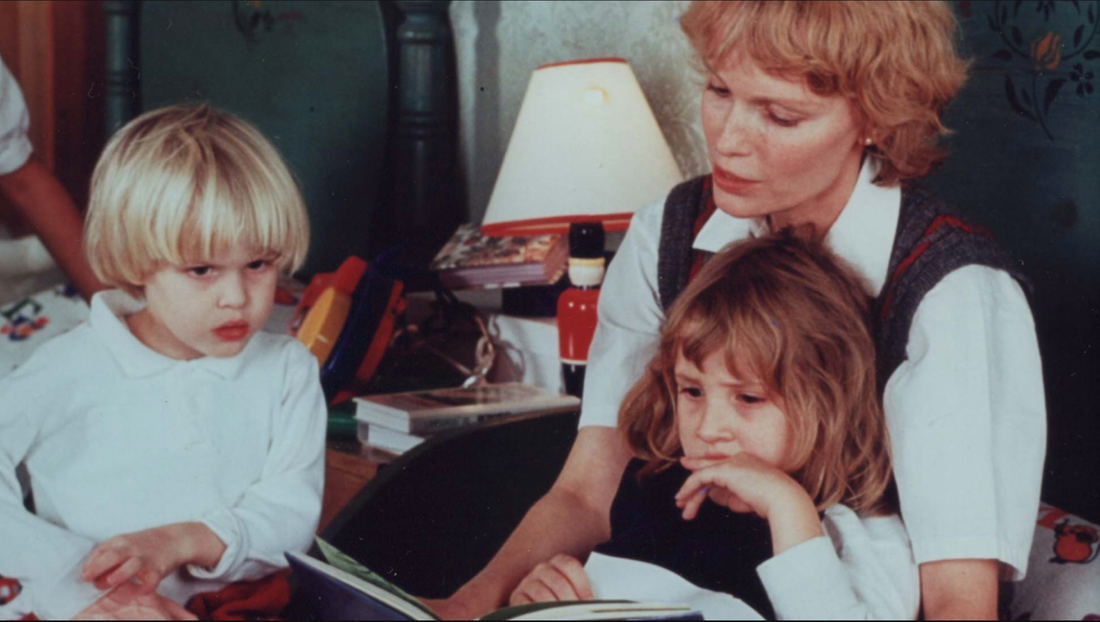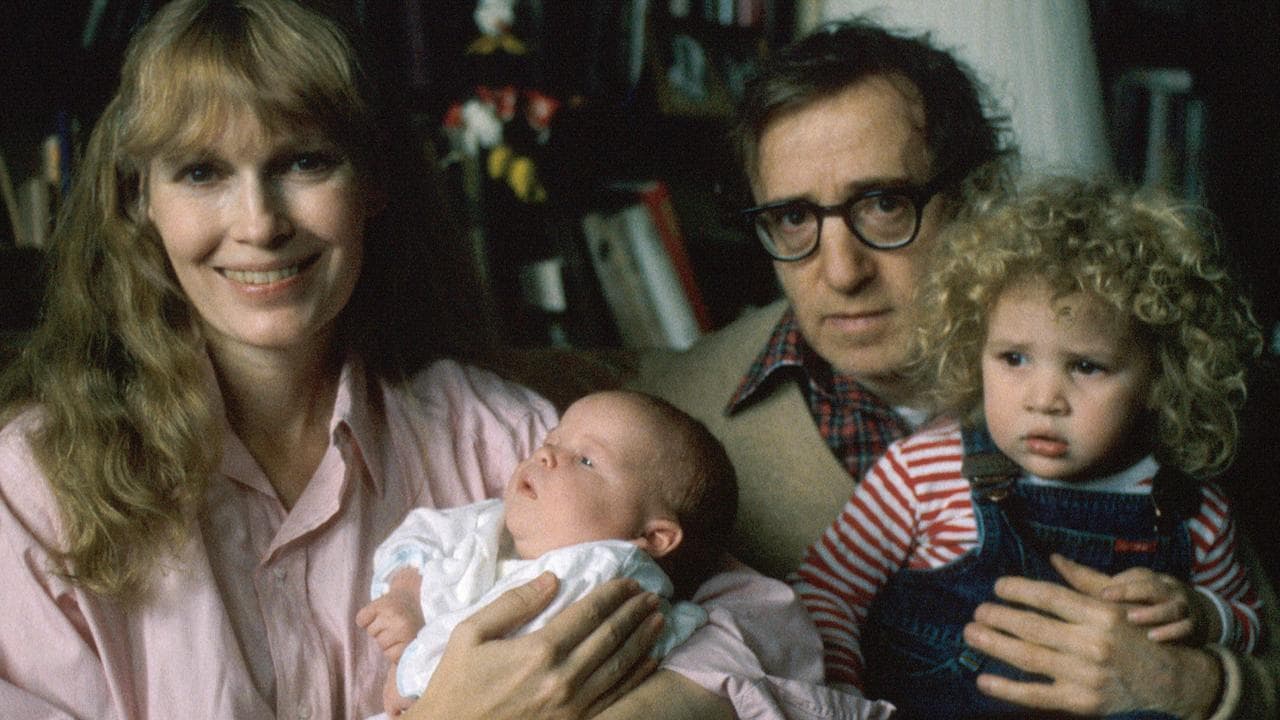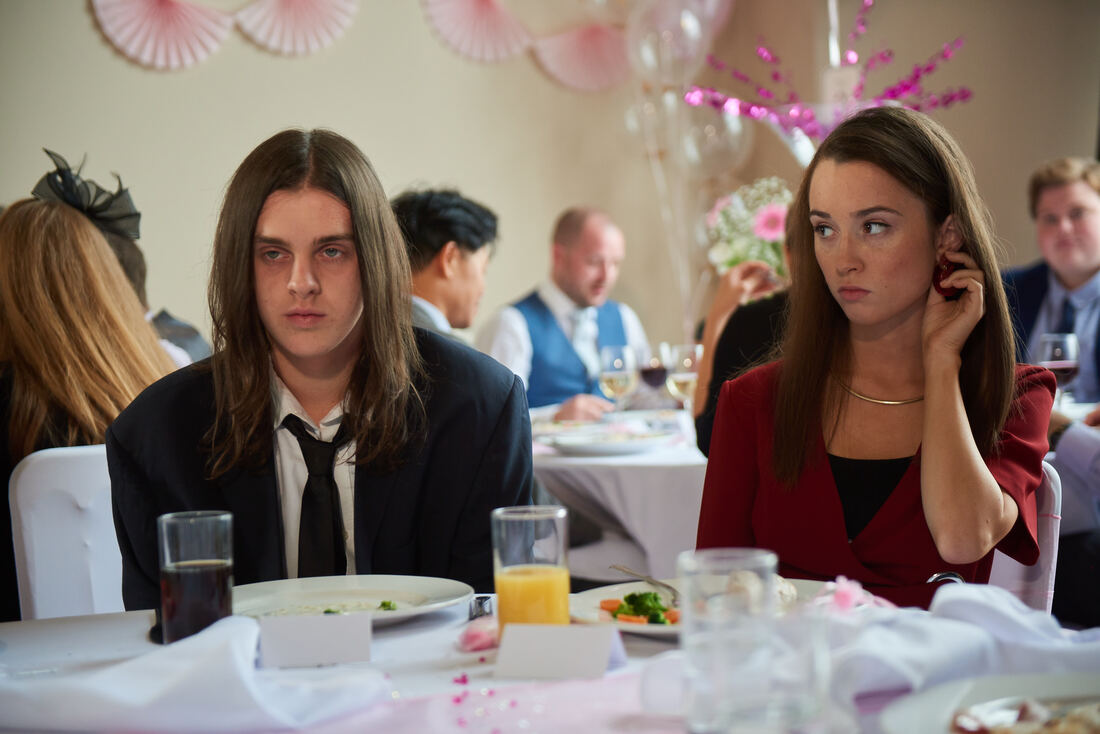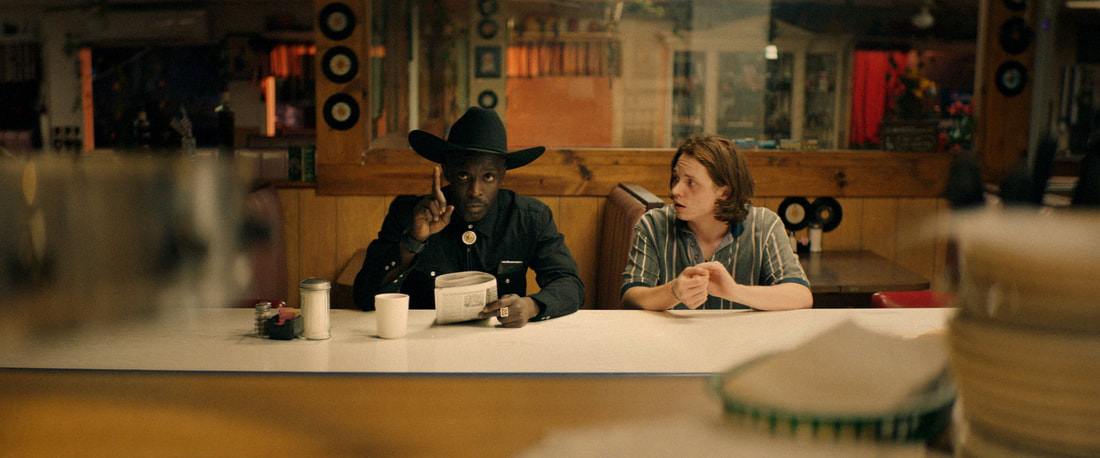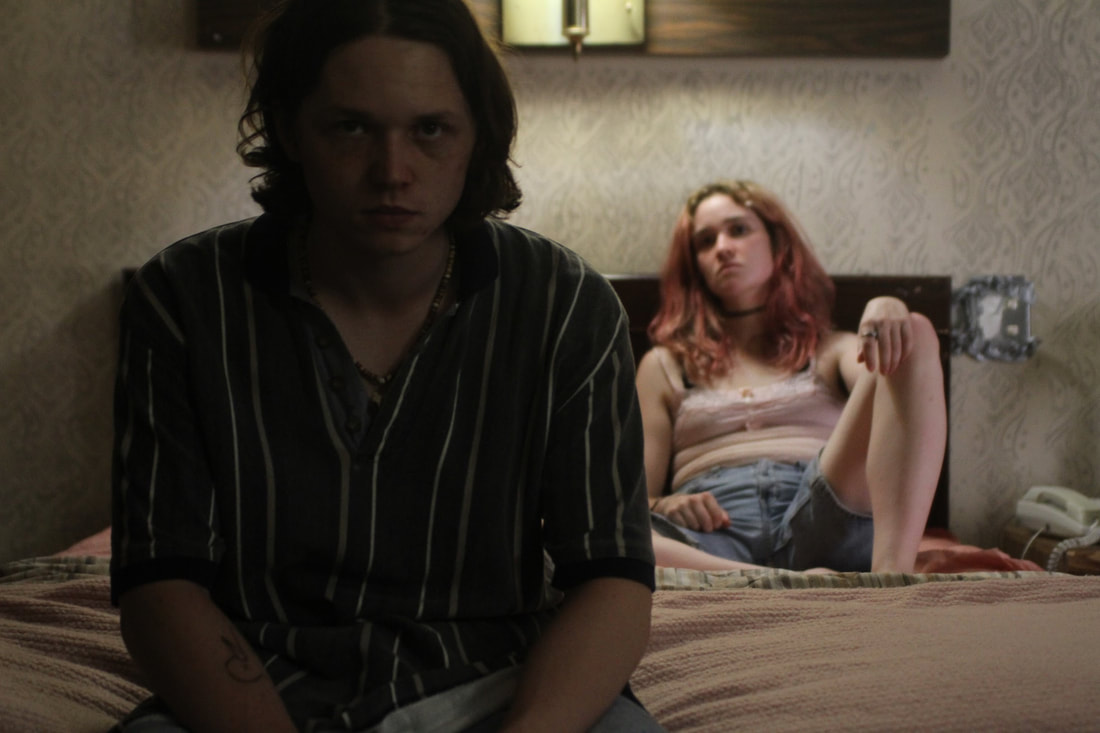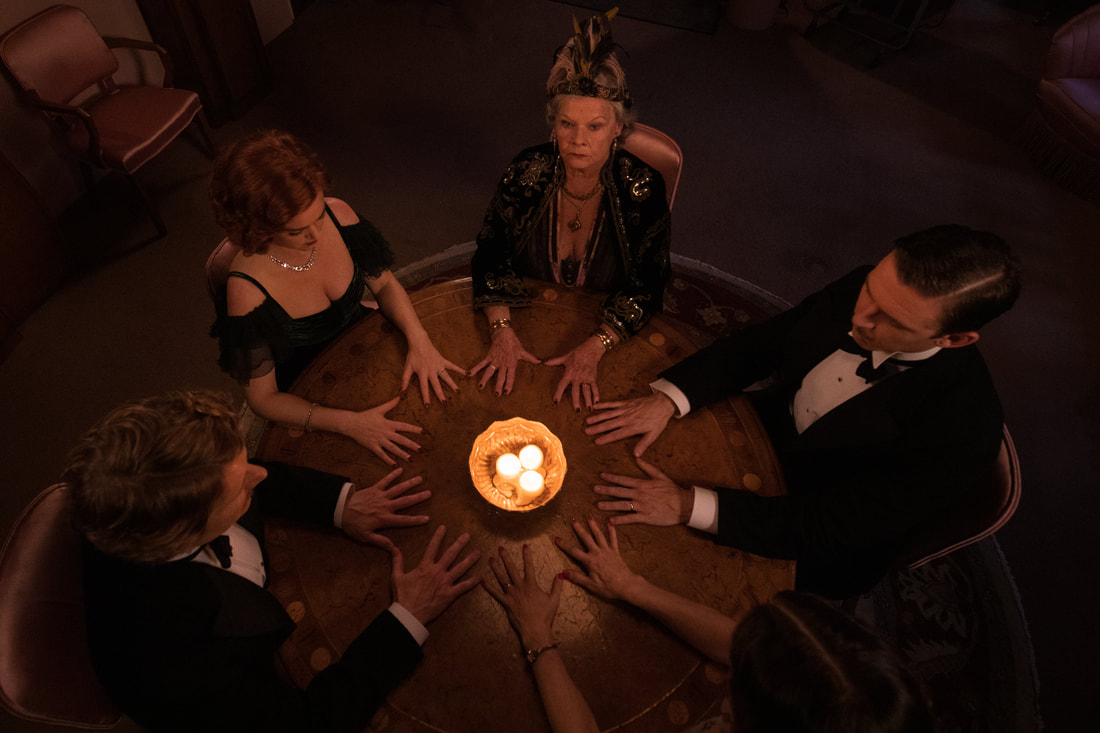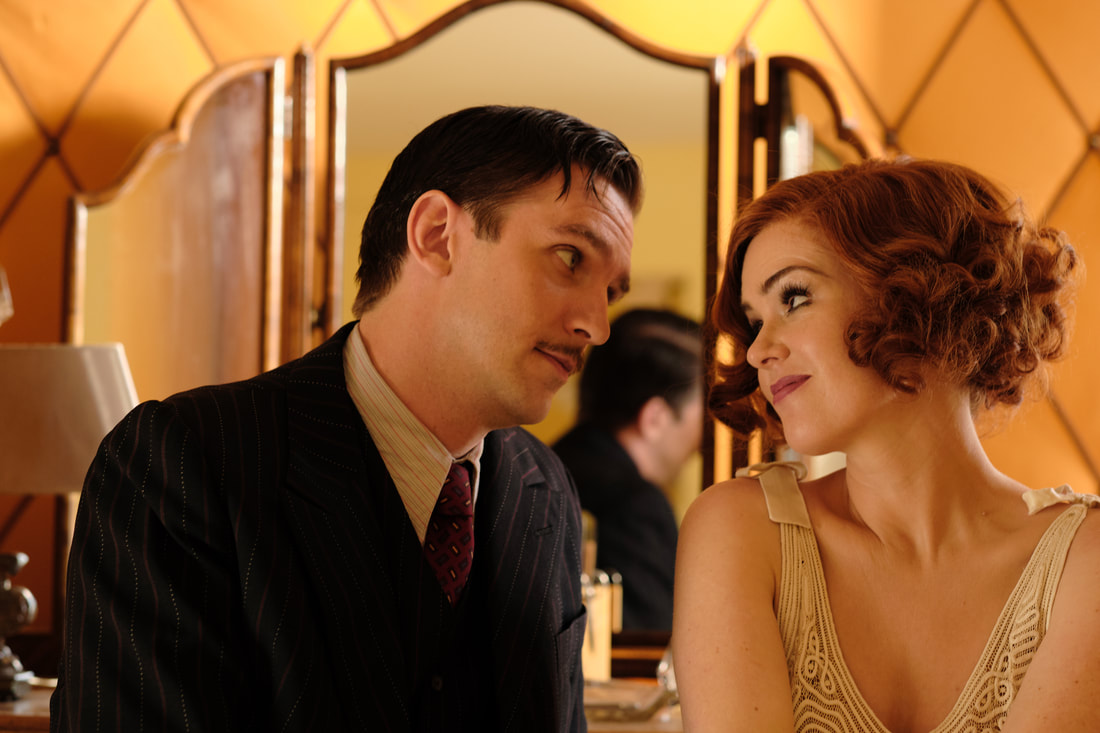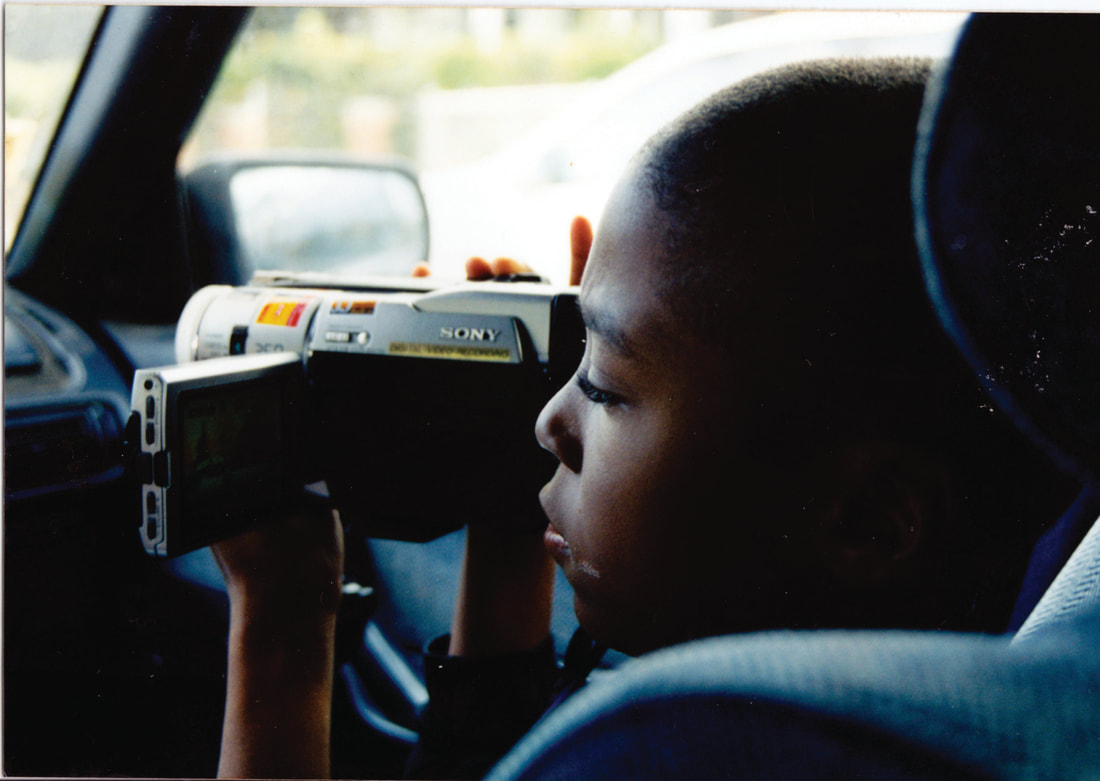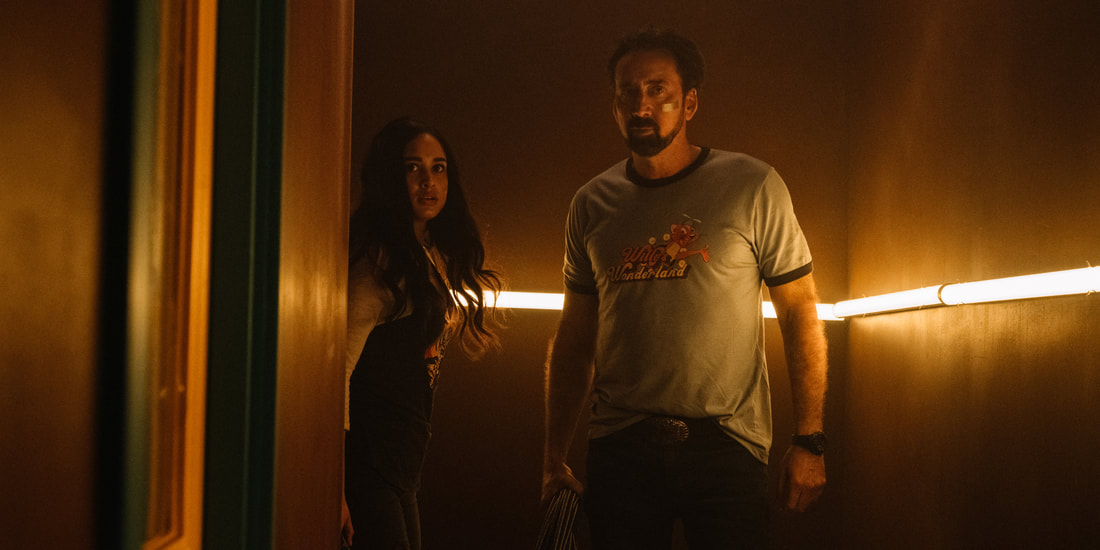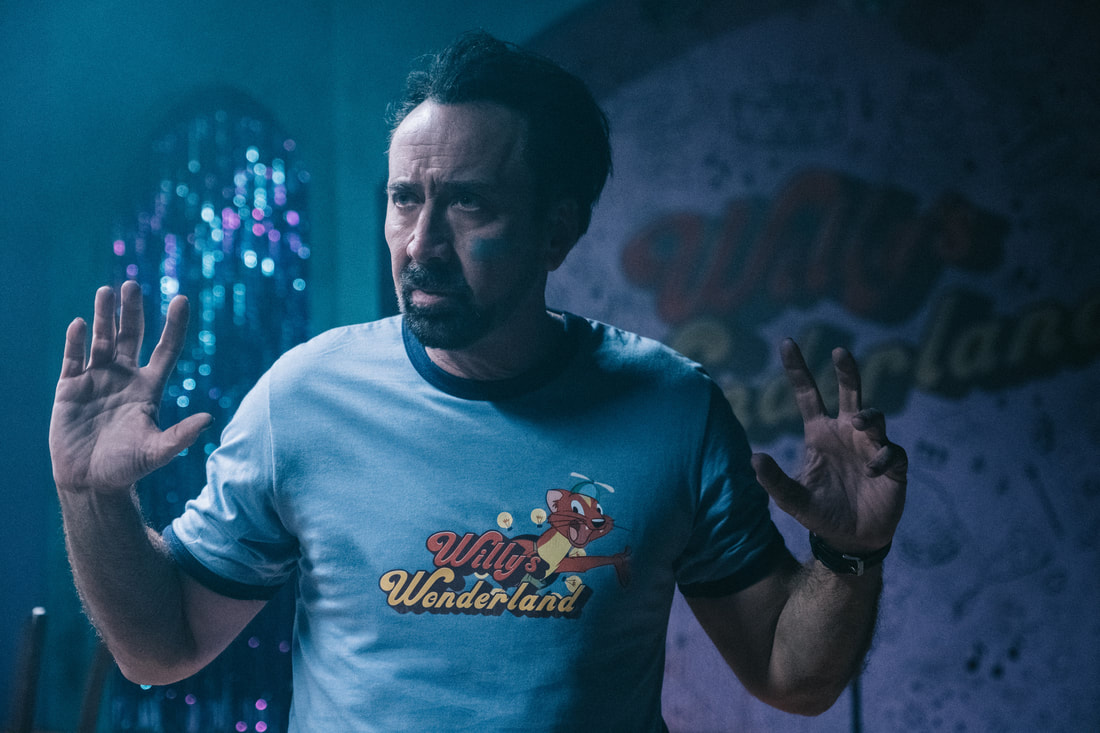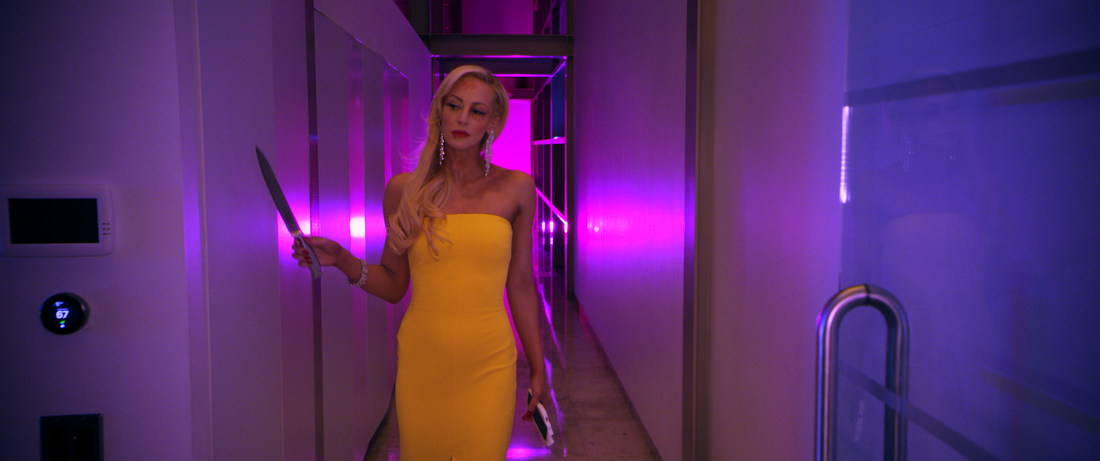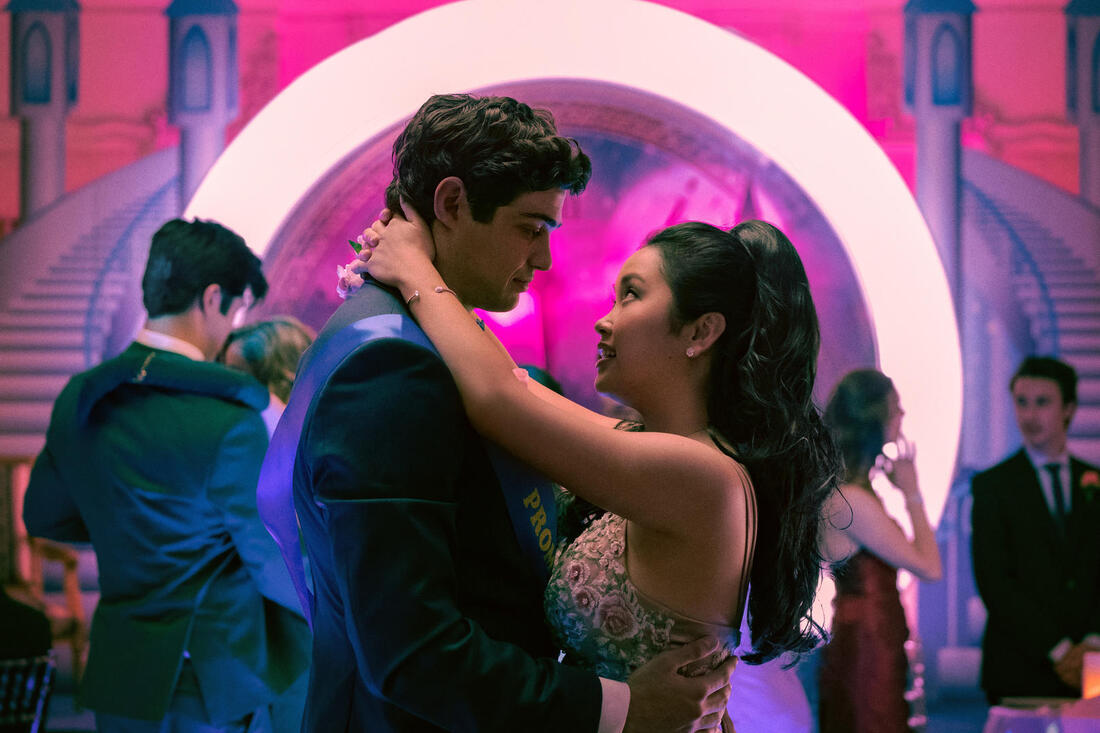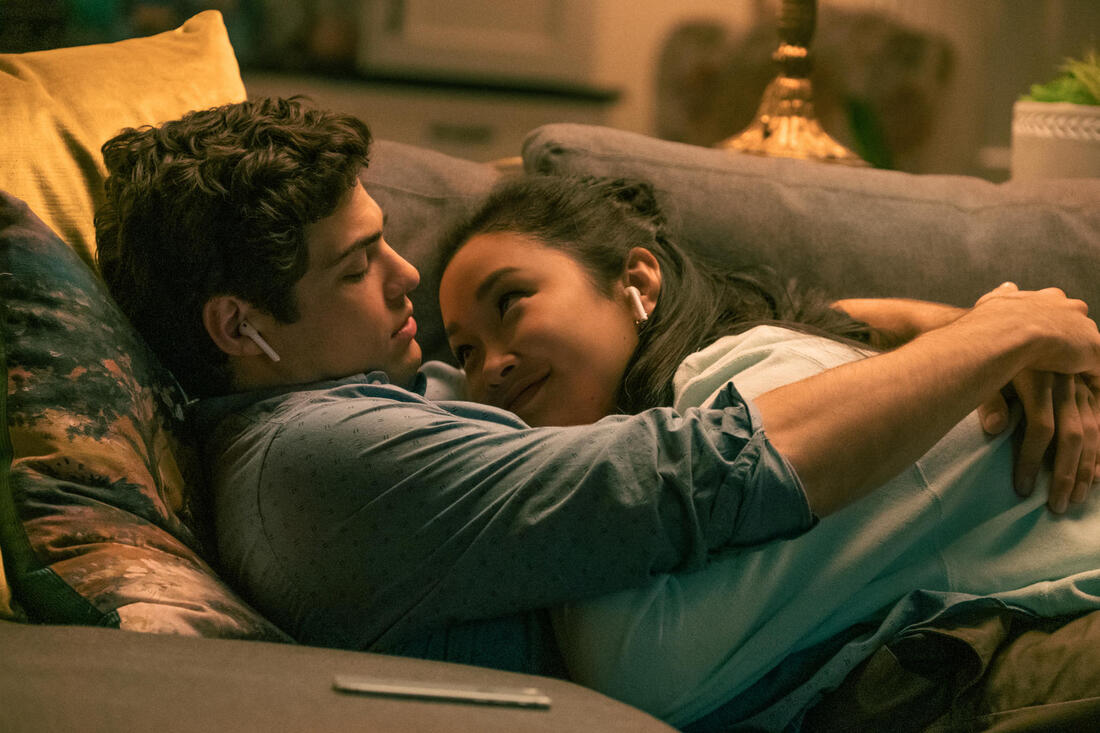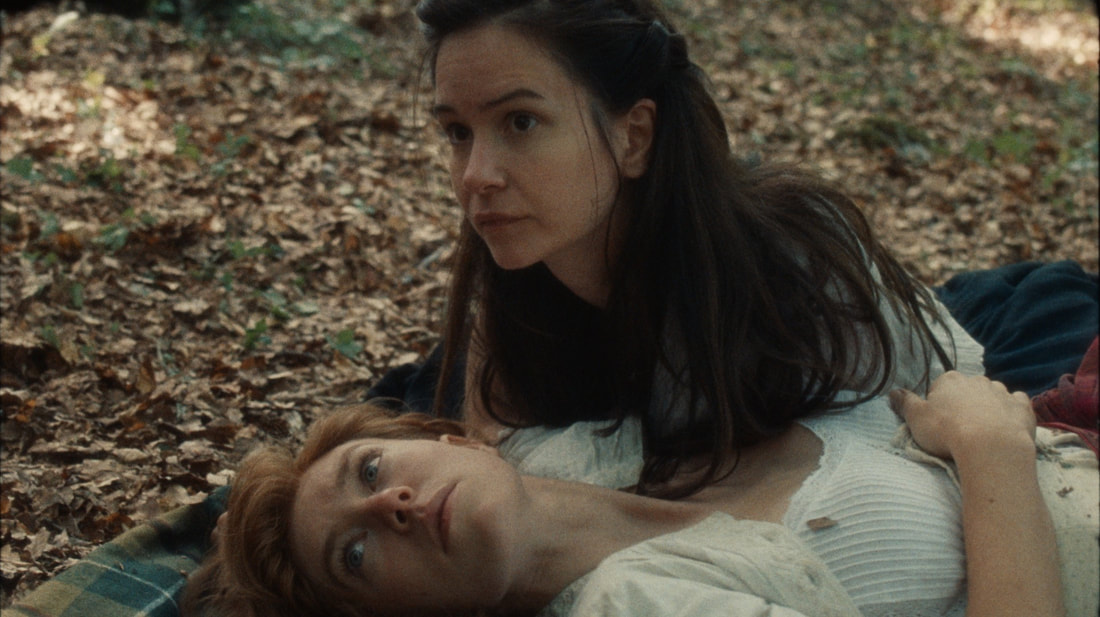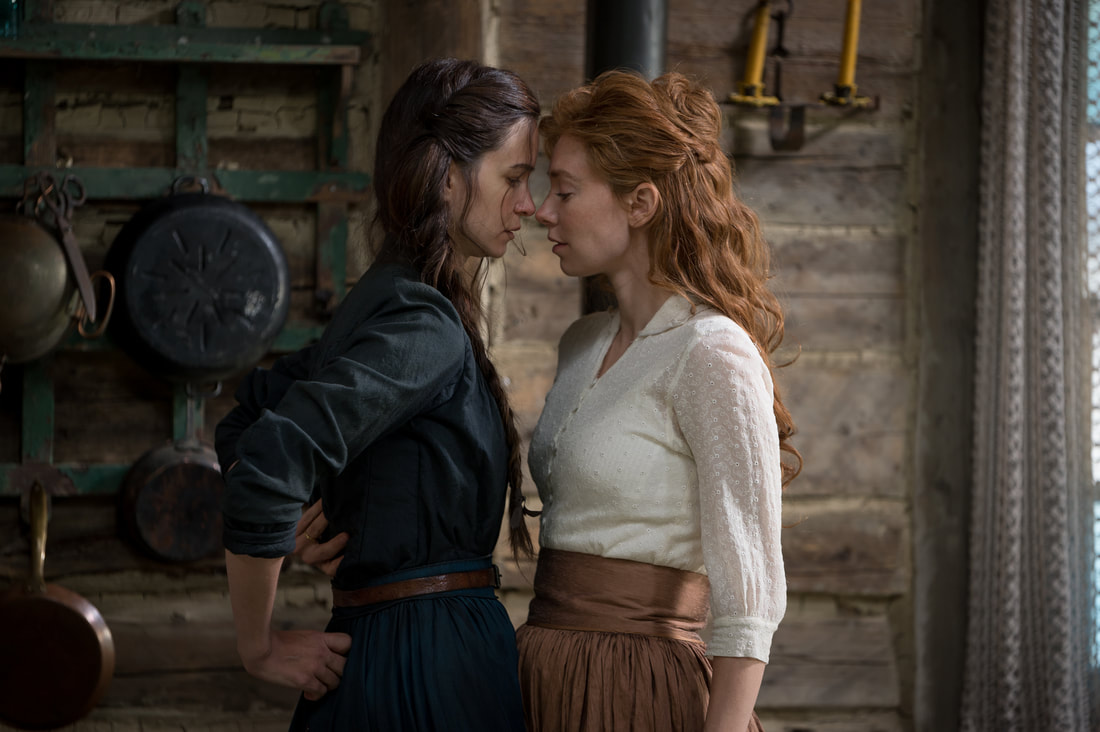|
Review by Camden Ferrell
After their acclaimed and fantastic documentary, On the Record, directors Kirby Dick and Amy Ziering return with Allen v. Farrow, a miniseries that details the sexual abuse allegations against Woody Allen in the 90’s. While the documentary doesn’t have as comprehensive a scope as the story warrants, it’s an effective look into the private life of its titular couple as well as the effect it has on the family unit.
Woody Allen was an Oscar winning writer and director who was much admired in the world for his contributions to the film world. His partner of 12 years and frequent co-star, Mia Farrow, was also a famous actress with a successful film career. However, their lives became the subject of public scrutiny after allegations were made that Allen had sexually abused his 7-year-old daughter, Dylan. This is an infamous story that is being brought back into the spotlight due to the current social climate, and it’s a surprising story that bears a lot of relevance on modern issues. Stories like this are often hard to approach. It’s a case that has been the source of lots of controversy and continued dispute, and the film had the task of trying to honestly tell its story without subjecting it to a lot of the sensationalism that has surrounded these events. For the most part, the series is thoroughly researched and presents the evidence and testimonies in a straightforward manner. It doesn’t use superficial techniques to try and add flair to the story, but it mostly focuses on the informed testimony and opinions of professionals in several different medical and legal fields. The series consists of home video footage, news reels, recorded phone calls, and an abundance of present-day testimony from its subjects. It can sometimes feel like there is an over reliance on this testimony, and it uses it as a crutch to supplement its narrative. While this provides more retrospective insight into events, it suffers from a lack of multiple perspectives. The Farrow family and their close friends make up most of the testimony, and it can make the whole series feel a bit one-sided at time.
One of the film’s biggest flaws comes from the aforementioned lack of perspective. The series justifies this by declaring that Allen, his wife, and one of his children refused to be interviewed for the series. However, for a series titled Allen v. Farrow, a lot of it centers around the Farrows. The series juggles the retelling of the allegations against Allen with the story and journey of Dylan Farrow. While these are both very important elements of the series, it never finds a good balance of those two dynamics.
The unevenness of its presentation is disappointing considering its ample runtime. At around four hours, it definitely feels like the series could have explored the actual case a little bit more as well as its aftermath. Of the four episodes, episode three is the most accomplished due to its brisk pace and compelling recounting of events. The other episodes can drag in comparison and not feel as entertainingly informative as the others. Despite its flaws, this is a thematically significant series especially in today’s social landscape. Regardless of your views on Allen and Farrow, it’s important to give consideration to the perspective of survivors now more than ever. This series heavily focuses on the enduring trauma left by abuse, and it’s an aspect that the directors really excel in, and it is the heart of the miniseries. Allen v. Farrow may provide new information even to those who are familiar with the case. It sometimes drags in certain episodes, but it’s an interesting exploration into the events surrounding this controversy. Allen v. Farrow, a 4-part mini-series, premieres on HBO and HBO Max February 21 at 9:00 P.M. EST. Rating: 3.5/5
0 Comments
Review by Sean Boelman
Based on the graphic novel by Joff Winterhart, Days of the Bagnold Summer is a coming-of-age dramedy set in a world that so many of us know all too well. Mildly funny and extremely heartwarming, this may not reinvent the wheel in a familiar genre, but its feeling of sincerity goes a long way in making it enjoyable nevertheless.
The film follows a teenage boy who is forced to spend his summer living with his single mother and listening to heavy metal music. The story hits all the regular beats of the formula without much deviation, but since adolescence is such a universal experience, these emotions will never cease to ring true. One of the interesting things about the movie, though, is that writer Lisa Owens seems just as invested (if not more so) in the story of the mother than her son. The result is a single mother character that is refreshingly well-rounded and does not feel in any way like the caricatures that parental figures typically are in films such as this. Admittedly, the movie doesn’t do quite enough with the specifics of the situation. It would have been nice to see a bit more time put into developing the mother’s dating life or the son’s passion for music, but it’s still admirable to see a film try to do something somewhat different in its portrayal of growing up.
At under ninety minutes in length, there was definitely plenty of room for them to expand on some of these ideas a little more heftily. The first act exploring the mother-son relationship is pretty effective, but the final act which tries to go into more of the subplots feels entirely rushed. The result is immensely watchable but also a tad forgettable.
Earl Cave makes for a very charming lead. His comedic delivery is very strong, but he also pulls it off in a way that doesn’t feel exaggerated. Monica Dolan struggles with some of the more emotionally weighty scenes, but her performance is mostly effective. And comedian Rob Brydon has a funny (as always) bit part. It does feel like a bit more could have been done on a technical level. Most comedy movies adapted from graphic novels have a visual quirkiness to them borrowed from their original medium, but this feels mostly plain. In his feature directorial debut, Simon Bird could have spared to do something a bit more distinctive. Days of the Bagnold Summer is a charming little film. Even though it is unlikely to make a very big splash in the sea of coming-of-age comedies that come out every year, it’s cute in a way that gets it an earnest recommendation. Days of the Bagnold Summer hits theaters and VOD on February 19. Rating: 3.5/5
Review by Sean Boelman
The Wolf of Wall Street and The Big Short ushered in a new era of true crime films with a comedic sense of self-awareness, but so many of these subsequent attempts have felt like imitations. John Swab’s Body Brokers certainly falls into that category, a passable but mostly mediocre movie that clearly wants to be more than it is.
The film follows a recovering junkie who gets wrapped up in a lucrative scheme in which companies profit off of fraud in the rehab industry. It’s an interesting stranger-than-fiction set-up, but in trying to make the story friendly for the Hollywood formula, Swab isn’t able to do anything particularly thought-provoking with the concept. Perhaps the biggest issue with the movie is that the pacing is extremely uneven. The first forty-five minutes are presented as an earnest drug recovery drama, only for it to turn into a sleek thriller for the remaining hour. It’s a significant case of tonal whiplash that would have been settled had the film settled into its schlockiness earlier. The things that the movie has to say about the opioid epidemic are pretty eye-opening. However, it often feels as if these messages are at the service of entertainment and not the other way around. Although there are a lot of harrowing facts and figures thrown out, they are almost always overshadowed by the film’s performative tendencies.
Another one of the movie’s shortcomings is in its character development. Although we are clearly rooting for the protagonist to get better, all of the supporting players that he encounters along the way are abhorrent. And perhaps most frustratingly, there is a narrator character whose role in the story isn’t introduced until the midway point.
Jack Kilmer is definitely the standout as the lead of the film. His performance offers the only thing resembling nuance in the entire thing. Michael Kenneth Green is probably the best supporting player, giving a performance that is enjoyably sly. Others, including Jessica Rothe, Frank Grillo, and Melissa Leo are underused. There are also some really strong scenes in the movie from a technical standpoint. Admittedly, the film can’t really decide whether it wants to be gritty or stylish, but there are a couple good examples of each to be found. The energetic montages in the second half are especially effective and fun to watch. Body Brokers may pale in comparison to the much better movies that obviously influenced it, but there are enough good moments to make it worth the rental fee. With a few more rounds of revisions, this had the potential to be something better. Body Brokers hits VOD on February 19. Rating: 3/5
Review by Sean Boelman
Noël Coward is considered by many to be one of the greatest playwrights ever, and as such, adapting his work is no easy task. The star-studded new version of Blithe Spirit may not be entirely necessary, but fun performances keep this comedy mostly entertaining even if it struggles when it tries to be something more.
The film tells the story of a writer suffering from writer’s block who finds himself in a jam when a medium accidentally summons the spirit of his dead wife and she ends up at odds with his current wife. Coward’s play was first performed in 1941, and it’s an interesting choice to keep this as a period piece rather than modernizing it. Although the focus here seems to be on the central love triangle, the more interesting aspect of the story is its exploration of the idea of plagiarism. Granted, it’s a much more niche and less widely relatable idea, but it’s also a much more original conflict, making the movie more compelling overall as a result. Coward does have a very specific sense of dry humor, and director Edward Hall wasn’t quite able to translate that to the screen. Instead, the film turns into a more straightforward slapstick comedy. There are still funny moments, but watching the ghost ex-wife and live wife trying to outwit each other gets old rather quickly.
Perhaps the biggest problem with this movie, though, is the character development. Coward’s plays are set in high society, but manage to humanize the characters. In this version, all of the characters feel like jerks, leaving us no character for which we are rooting. And cheering for all of their demise does not seem to be the purpose.
That said, the actors do a great job nevertheless, giving performances that are genuinely fun to watch. It’s great to see Dan Stevens getting more comedic work, because he has the chops to pull it off. Isla Fisher and Leslie Mann have a great dynamic as the protagonist’s two wives. And Judi Dench is great but underused in her role as the medium. On a technical level, the film looks pretty strong. The production design does an adequate job of setting the time period of the movie, even though it doesn’t fully dial up the quirkiness factor that could have made this even more enjoyable. Hall’s direction of the comedic beats is also competent, if straightforward. Blithe Spirit isn’t a great adaptation of Noël Coward’s work, but it’s a passable film by all means. It’s worth watching if only for the opportunity to get to watch the four leads chew the scenery at every possible chance. Blithe Spirit hits theaters and VOD on February 19. Rating: 3.5/5
Review by Dan Skip Allen
Documentaries can range from inside looks at the wild creatures who live in the world to never before told stories of people nobody ever heard of. A good documentary gets inside its subject matter. 17 Blocks is an up-close-and-personal look at a family in the inner city of Northeast Washington, D.C., only a short distance away from the Capital, but in actuality a million miles away.
The subject of 17 Blocks is the Sanford family from Northeast Washington, D.C. They struggle with inner-city violence, financial strife, gang banging, and drug addiction. Like any family of any walk of life, the Sanford family strives for a better life for themselves. Drama always creeps in and tears families apart. This family is no different than any other. Emanuel Durant is one of the sons and he gets himself into trouble and his life ends tragically. The family has to deal with his loss and how to move forward after a difficult time in their lives. The grieving will never end. It's just a matter of taking things day by day and week by week. Life still goes on for the rest of the family members. He had so much to look forward to in his young life, but he got involved with the wrong crowd and lost his life. 20 years of documenting this family had led to a lot of footage from when the children were young up until they were adults. They have experienced quite a lot of different scenarios regarding their lives. The death of Emmanuel hurt them all tremendously. He was only 25 years old. Finding a silver lining in the story is the key. The Sanfords gravitate toward religion and the Lord.
In a city like Washington, D.C., the crime rate is high. The police deal with quite a few homicides every day. The death of Emmanuel is just one of many. The police don't have time to spend on one unsolved murder when they have so many more to deal with. The family has to accept this sad fact of life. They move on but never forget his life.
The family moves around and lives in different places and that's a fact of having many children and not having enough money to take care of them. Having loved this sort of life, I can say it's not easy. It's hard on the kids growing up and makes the kids the sole responsibility of the parents. The parents have no life except to take care of their kids and try to provide for them. It's not a fun life for anybody involved. The documentary bounces back and forth, so the story can get a little confusing at times. It goes from the grandmother to her kids to the grandkids. Twenty years can be a lot of time to document. The filmmakers have a lot of footage to work with. In the end, this documentary is a deep dive inside this family. It gives a serious look at the lives of people in the inner city and how things can go wrong very quickly. 17 Blocks streams in virtual cinemas beginning February 19. A list of participating locations can be found here. Rating: 4/5 Review by Adam Donato Nicolas Cage is one of the most iconic actors of this generation. A man who can go toe to toe with Jim Carrey or Sam Elliot in their prime. Now that is range. Despite being such a prolific personality in Hollywood, Cage’s good movies are few and far between. That being said, the “so bad that it’s good” community probably has Cage on their Mount Rushmore next to Tommy Wiseau and Michael Jordan. The newest entry in the collection of insane Nic Cage movies is Willy’s Wonderland, a movie about a man burdened with the task of staying the night in a run-down children’s entertainment establishment. Willy’s Wonderland is directed by Kevin Lewis and written by first-time writer G.O. Parsons. What a goofy idea that was just executed so well. It’s a whole lot of fun and even has some legitimately scary things in it. The question is whether the viewer is into animatronics, just like how someone who is afraid of clowns is inclined to believe It is the scariest horror movie. Most of the creature designs are inspired, going for that post-apocalyptic Chuck E. Cheese vibe. Just seeing them on screen and maybe even move a little, one can’t help but to wonder what the robot looks like without the costume. It’s creepy imagery and it succeeds on the horror front. Imagine how different Drive would be if Keanu Reeves played the lead instead of Ryan Gosling. That’s what it’s like watching Nic Cage in this movie. A softspoken badass that isn’t even given a name. They have him listed in the credits as “the janitor”, which to be fair, is an absolutely correct statement. There is so much cleaning in the movie. It’s somewhat satisfying seeing the turnaround of the place. For some reason, Cage frequently plays pinball in a degree of passion that is unprecedented. It’s not art, it’s more like Johnny Blaze eating a jelly bean martini in Ghost Rider. To be fair, that’s where the movie really shines. There’s a group of teens that are somehow involved in the action. They basically act of the horror movie fodder destined to die at the hands of the killer. Classic stereotypes like the lustful couple sneaking off and the resilient final girl. To be honest, they play well off of Cage, which makes Cage look even better. The side characters add so much backstory to everything that is going on, which makes it an actual movie, as opposed to an elongated set of action scenes, cleaning, and pinball.
For what it is, Willy’s Wonderland delivers. It’s a classic movie to watch with a big group of friends and play along with it. It’s a B-movie, but it’s a really good one at that. There’s impressionably scary imagery, both legitimate and ironic laughs, and a crazy concept that lets it get away with being such a ridiculous movie. Their hook is pretty undeniable. It’s Nicolas Cage fighting a bunch of animatronic children’s characters. Willy's Wonderland is now in theaters and on VOD. Rating: 4/5
Review by Sean Boelman
Re-teaming duo Annie Mumolo and Kristen Wiig, Barb and Star Go to Vista Del Mar is either going to be hilarious or obnoxious for most viewers, depending on one’s sense of humor. There are a few decently charming moments to be found here, but it feels like most will see this for what it is: Kristen Wiig’s far less funny version of Austin Powers.
The film follows two best friends from a Midwestern town who are thrown into an unexpected adventure when they decide to go on a vacation and experience the rest of the world for the first time in their lives. What starts as a simple buddy comedy turns into something much more silly and convoluted, and it loses track of what would have made it shine. This isn’t quite thrilling enough to work as an action-comedy, nor is it raunchy enough to be a very good sex comedy. That makes it little more than an exercise in self-indulgent absurdism. Either you’re in on the joke, or you’re left out in the cold, wondering who it is that is supposed to think this is funny. Of course, there is a heavy-handed message about the importance of friendship and how honesty is essential for friendships to survive, but it’s nothing particularly unique or original to say. And the villain’s motivation and the moral that goes along with that story is even more frustratingly conventional.
The characters in the movie are sure to be divisive. Some will find them to be lovable goofs, but others (this critic included) will find them to be grating. Mumolo and Wiig are very obviously having the time of their lives here, but their welcome wears out a few minutes in as it becomes clear how one-note their turns are going to be.
Wiig does double duty here, also playing the film’s villain (further reminiscent of Austin Powers), but she seems to have put more effort into her half of the eponymous duo, for better or worse. Jamie Dornan is a potential scene-stealer, having the movie’s few genuinely funny moments, but he also feels a little out-of-place. It is in a visual sense that the film shows the most potential, but it is rarely delivered upon. Only in a few scenes in which the movie truly embraces its campiness, like a few musical numbers, does the film live up to its promise of true quirkiness. More often than not, it feels like a bunch of ideas that might have been funny on their own but blend into something less satisfying. Barb and Star Go to Vista Del Mar simply isn’t that funny, but not for lack of trying. Mumolo and Wiig seem to think this is hilarious, and so will some audience members who appreciate their comedy ridiculously over-the-top with no edge to it, and good for them. The rest of us will find it a chore to get through. Barb and Star Go to Vista Del Mar hits VOD on February 12. Rating: 2/5
Review by Sean Boelman
Often when a filmmaker serves as writer, director, and star of a film, it is out of necessity, but Louise Linton’s Me You Madness is a vanity project if there ever was one. Inconsistent in pretty much every sense, this is a mildly entertaining but mostly forgettable film that could have used a clearer vision at the helm.
The film follows a young thief and an eccentric serial killer who match wits with each other when he tries to rob her house. In one sense, it desperately wants to be a female American Psycho, but it lacks the nuance or insight to pull that off, yet it is also too dark and bitter to be particularly successful as a romantic comedy. Perhaps most damning is the fact that the film is divided pretty cleanly in two, and that structure doesn’t really work. For the first forty minutes or so, the film follows the serial killer as she takes advantage of the bumbling thief, only for them to be pitted against each other for the rest of the film. It’s such a massive shift that it doesn’t work. There are also a lot of references and tongue-in-cheek moments in the film that largely don’t land. The near-constant breaking of the fourth wall becomes grating after a while, especially when the script seems to think that it is much smarter than it actually is. Brief glimpses of edginess interspersed with consistent over-the-top campiness is less than satisfying.
The idea of a wealthy female killer is an interesting one, but the personality that Linton gives to her is so scattered that it doesn’t exactly pay off. It feels like an amalgamation of so many other great characters that came before it. On the other hand, the romantic interest is about as cookie-cutter as they come.
Linton is most successful in the film as an actress. She brings an unhinged quality to the character that is pretty much the only thing holding this mess of scraps together. Co-lead Ed Westwick’s performance is far less memorable, although the chemistry he has with Linton is good enough to keep the viewer invested. For better or worse, the film definitely isn’t lacking in visual energy. The editing style is truly erratic, there is some awful sound design, and Linton employs some annoying visual gimmicks. The only good thing about the execution is the soundtrack, which is filled with fun (if clichéd and basic) tunes to give the film a playful tone. Me You Madness should be an absolute nightmare, but somehow, it manages to be mostly bearable despite all the factors working against it. Even if it is an imitation of better films, it’s not the worst rip-off there has been. Me You Madness hits VOD on February 12. Rating: 2.5/5
Review by Camden Ferrell
To All the Boys: Always and Forever is the third installment of the film series based on Jenny Han’s novels. Veteran cinematographer Michael Fimognari is back in the director’s chair after directing the film’s second installment. While the final movie in this series doesn’t tread new ground, it hits the same cheesy rom com beats as its predecessor and will please fans of the series.
Lara Jean is now a senior in high school. This year brings new challenges and changes in her life. She juggles her family, her future, and her relationship with Peter as new experiences prepare her for her future after graduation. This premise benefits the movie by being slightly different from its predecessors. There’s no gimmick like the first movie, and there’s no love triangle like the second, and this allows it to feel somewhat fresh in context of the larger story. Katie Lovejoy’s first feature-length screenplay is as sweet and cheesy as one could expect. It pays homage to the rom com genre while simultaneously playing safely by its rules. This can lead the film to feeling very formulaic and predictable, but these movies revel more in its low-risk cuteness rather than any narrative deviations. It’s a sweet and simple script that is probably the best of the franchise even if it is just as boilerplate. One could easily assess that the acting from the lead couple is strongest in this movie. After two movies, they both develop a genuine on-screen bond that is very believable while also being completely cliché. Lana Condor is as adorable and ambitious as she’s ever been as Lara Jean, and Noah Centineo finally plays a toned-down Peter. This allows the movie to feel more realistic, and it makes it easier for the narrative to highlight their connection.
The first film was about them finding love, and the second was about enduring love through the drama of high school life. The reason the third one feels more visceral is that it’s about pushing love to the limits while our leads are on the cusp of adulthood. It’s the most honest the series has ever been. It is definitely not without flaw, but there’s a certain spark present that the previous film’s lack.
While this is the most accomplished film of the series, it still suffers from many of the same mistakes. I’ve already mentioned the inherent predictability and derivative nature of these movies. However, the movie also fails when it comes to the film’s supporting cast. The side characters don’t feel fleshed out, and they sometimes skirt the fence of believability. Even though the film is still incredibly flawed and never really becomes anything beyond a cheesy Netflix rom com, it is a satisfying ending for our protagonists. It’s the ending that was always expected, but it’s nice to see a franchise wrap up their story so neatly for its die-hard fans. There are many things working against this film, but fan service is not one of them. To All the Boys: Always and Forever will please fans of the franchise and of the rom com genre as a whole. It suffers from the same predictability and cheesiness of the previous films. However, if you enjoyed the first two films, you would absolutely adore the final movie in the series. To All the Boys: Always and Forever is available on Netflix February 12. Rating: 3/5
Review by Sarah Williams
Love letters are the most common surviving relic of relationships between women of the past. Diaries and notes are pieces together, getting a half idea if love affairs that, while not outwardly forbidden, went unnoticed in a male-driven society. These female friendships were often tinged with a burning passion, commitment beyond that to a husband. The World To Come is a chain of such love letters and diary entries, threaded into a delicate love tragedy, that though flawed, is so believably rendered, with a pleading, beating heart of chemistry.
Abigail (Katherine Waterston) has recently lost her daughter from diptheria in late 19th century Upstate New York. A winding diary entry monologue details her detachment from her husband and child, and how she feels that she has become her grief. Redhead whirlwind Tallie (Vanessa Kirby) falls into her life one day, met at the edge of their property, and the two women begin to meet often, and grow close, coming alive with the company. It's a romance film, but it's more about the awakening than anything. We see Abigail roll over in the night and express her newly articulated discomfort for physical intimacy with her husband before we ever see her and Tallie do the same. This, in large part, is a film about ecstasy, and finding something holy in love. Tallie's visits come weekly, and they're a light in Abigail's life that leaves her breathless and excited each time, even when it's something as simple as plucking chickens together. That religious ecstasy climaxes when Tallie's visit ends in a gently burning kiss. Abigail seats herself on a bench when she shuts the door behind her, and lays back against the table. Her arms outstretch, her neck cranes back, and dark hair and billowy dark sleeves and skirting pool around her. She looks to be sacrificed to some power above, spare for a sigh of pleasure that comes with having known joy in love that day.
For Abigail and Tallie, finding pleasure becomes like heaven. The two women find a certain freedom in their escapes together, laying in a small clearing in the forest for gentle affection. Small rays of sunlight find them here, and they are able to strip down a bit and blend in with nature in their joy. Abigail saves her money to buy an atlas, as she dreams of far off places, and longs for that tactile feeling of pages beneath her fingertips. For her, in those coming months, Tallie will become her world, and she'll be that atlas of pages of memories she can take to love on with her. Abigail once says "And you know what memory it is that I most cherish? It's of your turning to me, with that smile you gave me, once you realized that you were loved", and it really sums up the power she finds in having this brief love, and in being able to make someone else feel that same joy she does. Cliche, but it's the power of a good love story.
The film is far from without its issues, and they may overwhelm it for others. While many praised the score as innovative and beautiful, a fellow disappointment media critic referred to the sound as "like someone had deep-throated an oboe" after the Sundance screening. This is a minor and subjective issue, however, compared to the film's messy messaging when it comes to the finale. A turn for tragedy breaks the rhythm of the film, and feels unnecessarily cruel (not to mention the misplaced sex scene) when this plot point is there for a message that love can be what awakens you, and that the memory is important. There are so many less jarring ways to do this, that don't feel like a tonal pitfall, and changing the original short story ending feels warranted here. Abigail's diary entries sometimes feel like a copout to avoid showing the intricacies of dialogue, though they're usually wonderful. Also, this is a movie starring Casey Affleck. Do what you will with that. The World To Come has its missteps, but the fantastic chemistry of those first two acts make it emotionally devastating enough some of its issues can be forgiven. It's bluntly realistic enough about each of the two women's situations, whether they be grief or an unhealthy relationship. This frankness makes the moments we don't see easier to fill in, easier to see what level of passion Abigail and Tallie have between the scenes. With splendid craft all around, it's an ideal Valentine's Day alone and cry movie. The World to Come hits theaters February 12 and VOD on March 2. Rating: 4/5 |
Archives
May 2024
Authors
All
|
|
|
disappointment media
Dedicated to unique and diverse perspectives on cinema! |

